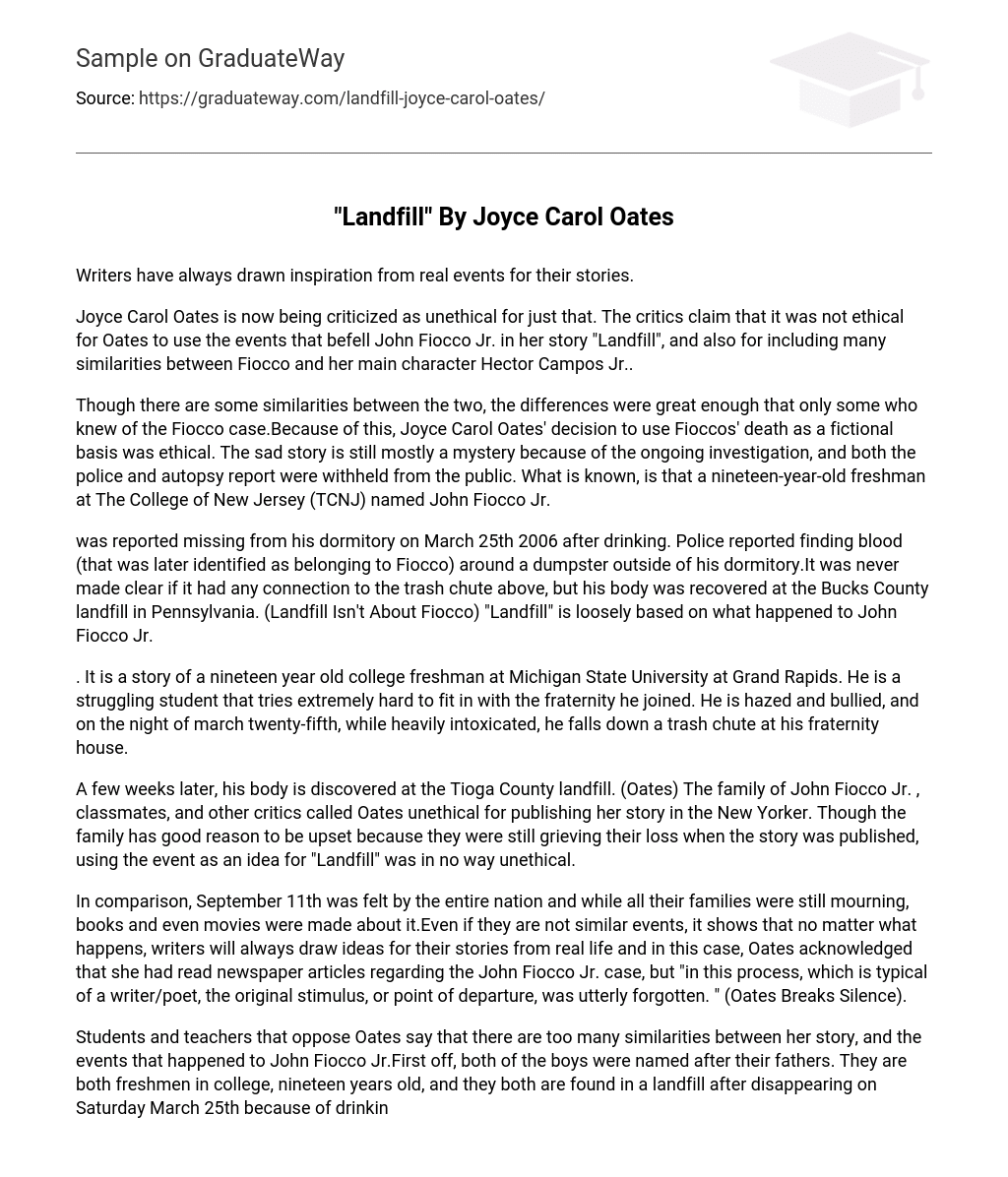Writers have always drawn inspiration from real events for their stories.
Joyce Carol Oates is now being criticized as unethical for just that. The critics claim that it was not ethical for Oates to use the events that befell John Fiocco Jr. in her story “Landfill”, and also for including many similarities between Fiocco and her main character Hector Campos Jr..
Though there are some similarities between the two, the differences were great enough that only some who knew of the Fiocco case.Because of this, Joyce Carol Oates’ decision to use Fioccos’ death as a fictional basis was ethical. The sad story is still mostly a mystery because of the ongoing investigation, and both the police and autopsy report were withheld from the public. What is known, is that a nineteen-year-old freshman at The College of New Jersey (TCNJ) named John Fiocco Jr.
was reported missing from his dormitory on March 25th 2006 after drinking. Police reported finding blood (that was later identified as belonging to Fiocco) around a dumpster outside of his dormitory.It was never made clear if it had any connection to the trash chute above, but his body was recovered at the Bucks County landfill in Pennsylvania. (Landfill Isn’t About Fiocco) “Landfill” is loosely based on what happened to John Fiocco Jr.
. It is a story of a nineteen year old college freshman at Michigan State University at Grand Rapids. He is a struggling student that tries extremely hard to fit in with the fraternity he joined. He is hazed and bullied, and on the night of march twenty-fifth, while heavily intoxicated, he falls down a trash chute at his fraternity house.
A few weeks later, his body is discovered at the Tioga County landfill. (Oates) The family of John Fiocco Jr. , classmates, and other critics called Oates unethical for publishing her story in the New Yorker. Though the family has good reason to be upset because they were still grieving their loss when the story was published, using the event as an idea for “Landfill” was in no way unethical.
In comparison, September 11th was felt by the entire nation and while all their families were still mourning, books and even movies were made about it.Even if they are not similar events, it shows that no matter what happens, writers will always draw ideas for their stories from real life and in this case, Oates acknowledged that she had read newspaper articles regarding the John Fiocco Jr. case, but “in this process, which is typical of a writer/poet, the original stimulus, or point of departure, was utterly forgotten. ” (Oates Breaks Silence).
Students and teachers that oppose Oates say that there are too many similarities between her story, and the events that happened to John Fiocco Jr.First off, both of the boys were named after their fathers. They are both freshmen in college, nineteen years old, and they both are found in a landfill after disappearing on Saturday March 25th because of drinking. Even with some similarities, Oates did not intend to cause the Fiocco family distress, and stated this in an apology that was published in The College of New Jersey school paper.
It said “My wish to evoke sympathy for a relatively “ordinary” individual was predominant, but I see, to my dismay… many angry sentiments” (Oates Breaks Silence).
In “Landfill”, Hector Campos Jr. s described as a looser that struggles in school, and is hazed by the brothers in the fraternity he is pledging for. Fiocco, on the other hand, was a graphic design major, on the honor role, and was never in a fraternity (Search Continues). The differences are mistakable, and even a fiction editor for the New Yorker said that when it was published, editors at the New Yorker did not know about the Fiocco case (Amelkin).
As if that was not enough, The Daily Princetonian reported that “Though “Landfill” has thrust Oates and some faculty members into the headlines, many TCNJ students remain unaware of the situation” (Amelkin).In the end, only select few who read “Landfill” connected it to the Fiocco case because of the differences between the boys and the events that occurred. In an email to the Prince, Oates acknowledged that it was only people from the New Jersey area that made this connection, and also commented that “Most of my short fiction appears in literary magazines..
. If the story had appeared in one of these, it would have passed unnoticed” (Amelkin). Had it been so, Oates would have never received the kind of criticism that she has, and would therefore not be accused of being unethical.Even with the similarities in age, being named after their father, and the way in which both were found, the fictional character did not portray what happened to Fiocco.
The differences were so great that only a few noticed that Oates used his case as a fictional basis for her story “Landfill”. Had Oates published her story in a literary magazine, it would have never been looked upon as unethical. Written in good taste, “Landfill” has nothing but an ethical origin.





